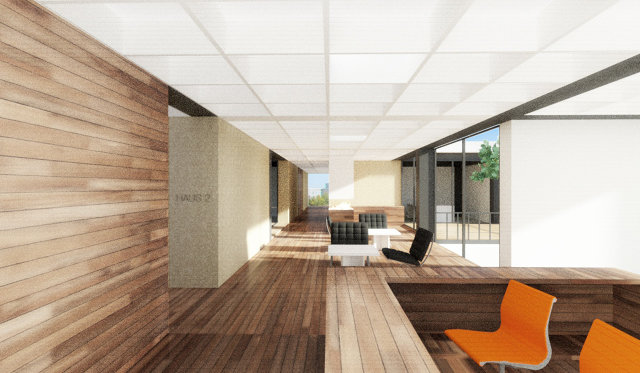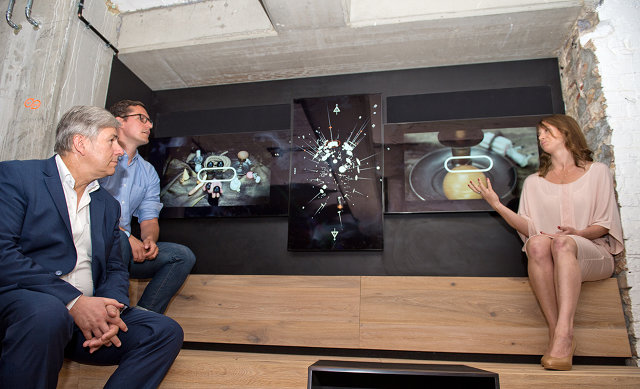A STARTUP "FACTORY" THAT STRADDLES THE BERLIN WALL IS TWITTER'S NEW HOME IN GERMANY
ZENDESK, SOUNDCLOUD, AND MOZILLA ARE AMONG THE FIRST TENANTS OF A MASSIVE BUILDING THAT INCLUDES FUNDING FROM GOOGLE FOR ENTREPRENEURS.
“I want robots, I wants drones flying around,” says Simon Schaefer, bounding into a meeting room on the top floor of the main Factory building, waving an espresso. As this extraordinary 170,000 square-foot campus--Berlin’s first major startup hub--finally opens after a 30-month gestation, its 37-year-old founder is entitled to think big.
Indeed, even before the first tenants, which include Twitter, Mozilla, SoundCloud, and Zendesk, have unpacked, Schaefer is scouting the city for more space. Not even the World War II grenades that were recently unearthed in what will become the main courtyard, when deemed safe, have dampened his enthusiasm for grand designs. He rolls a detonated shell around his desk. Factory, says Schaefer, will be “a playground for entrepreneurs that will help to transform Berlin.”
The campus straddles the former Berlin Wall, including a section that was known as the "death strip." One side of the main building--which has open-plan wooden flooring, full-height glass, and resort-size terraces--actually formed part of the interior of the Wall. When complete there will be a health club, lounges bars with “big music systems,” a deli and restaurant, and, as this is Germany, saunas and loads of sporting events. Programmers and designers can apply for free on-campus accommodation, for up to six months at a time.

The venture is a pretty striking symbol for this reinvented city. “Out of the first hundred people working here, there are 30 nationalities,” Schaefer tells Fast Company. By September, around 500 people will be bedded in, many drawn to Berlin by its hedonistic-meets-grown-up lifestyle. Indeed, MTV's recently revamped Berlin headquarters look a bit staid in comparison with Factory.
This coolness factor is partly why Twitter, whose popularity lags behind other social networks in Germany, has chosen Factory as its base to reboot its operations in Europe’s most dynamic economy--especially as the company is moving aggressively into mobile advertising. Twitter’s 15-person team will be led by two senior executives. Thomas de Buhr, most recently Google’s branding chief for the German speaking countries, will create a sales team to target advertising agencies in Germany. Rowan Barnett, meanwhile, will try to raise Twitter’s profile by encouraging politicians and celebrities to tweet.
"The success story of Twitter can be an inspiration for Berlin-based startups," said Barnett, speaking outside Factory earlier today. "We are delighted to be working at this historic location."
Google executive chairman Eric Schmidt was also on hand to deliver a rallying speech about inclusivity, he ended by congratulating Germany "for finally becoming a Start-up Nation." Google, which has a notoriously prickly relationship with Germany as a result of often falling afoul of the country's strict privacy laws, has pledged €1m ($1.35m) to the project through its “Google for Entrepreneurs” program.

SoundCloud’s expansive digs, meanwhile, will incorporate “a den” which will feature a functional fireplace, a record player, and absolutely no computer screens. The idea is that here people can disconnect a little.
Startups have free use of a 400-capacity auditorium to host events, and there will also be a startup fair every summer and dinners where founders meet other people looking to interact. Although the idea is that tenants will cross-pollinate each other financially, Factory plans to launch a €100m fund in the next few weeks to bridge the gap between late-seed and early series A funding. “Getting traction at that point is the hardest thing for startups in Germany,” Schaefer says.
“It is vital that we create an environment where smaller local companies can learn from established ones,” says Schaefer, citing companies such as software startup 6 Wunderkinder, which now has 90 employees, and Lime Makers, a new 3-D-printing venture, backed by Skype and Spotify investors.
While Factory may seem quirky and quite German, it is a template that Schaefer aims to replicate in other cities throughout Europe and beyond. “We created Factory as a model that we could license and I think it would work in places such as Athens, Barcelona, Lisbon, or Tel Aviv. I definitely want to open at least one somewhere else," he says. "For now, I guess, it's ‘watch this space.'"
[Photo by Bernd Von Jutrczenka, Picture-alliance, Dpa, AP Images]
No comments:
Post a Comment